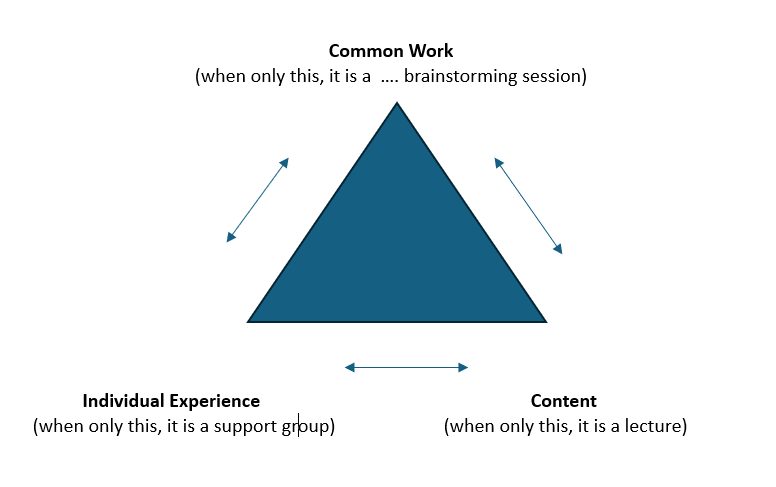32 Now the whole group of those who believed were of one heart and soul, and no one claimed private ownership of any possessions, but everything they owned was held in common. 33 With great power the apostles gave their testimony to the resurrection of the Lord Jesus, and great grace was upon them all. (Acts 4:32-33)
This text from Acts about the first actions of the early church has been put to many purposes in the last 2,000 years. To our knowledge though, it has never been applied to church board meetings.
Recently we have been discussing a conversational triangle that characterizes healthy board discussions. We have focused on the importance of engaging both content and individual experience in those discussions. A mix and movement of rich content and authentic personal experience brings us to the crucial third point of the triangle: common work.
Just as a meeting that contains nothing but content (however rich) can turn into a lecture … and a meeting that relies only on personal experience (however deep) can morph into a support group … so too, a meeting that focuses only on the board’s common work can quickly become an unanchored brainstorming session, without depth, or richness, or forward motion, in which everyone is throwing their thoughts against the wall, and nothing is sticking.
The early church, as depicted in Acts, shows a boldness in its discipleship, as well as its vision for ministry. And yet, as Willie Jennings notes in his commentary on Acts, “In fact, boldness is not the ultimate gift, but the intensification of the common.”
Jennings continues:
The common is the gift realized in the Spirit. This part of the great drama confronts us again with the new order of giving rooted in the divine wanting, rooted in the divine desire to join us together. These followers of Jesus released themselves to one another, making themselves responsible for and accountable to one another. Matters of money are inescapable. They are at the heart of discipleship, but they are not the heart of discipleship. Money here will be used to destroy what money normally is used to create: distance and boundaries between people. Distance and boundary is not merely between the haves and have-nots, but also between the needy and the comfortable, and between those who testify to Jesus and those who, like Jesus, help those with little or nothing. Jesus will join us and he will use whatever we have to make the joining possible. We are yet to hear clearly this ancient strategy of the Spirit.
Too often in our reading of this story our view is clouded by the spectacular giving and we miss the spectacular joining.
The giving described in Acts is indeed spectacular. And of course, money is at the heart of many, many church board discussions – but, to paraphrase Jennings, money is not the heart of these discussions, properly understood. Acts serves to guide boards in a very different direction than most board budget discussions go.
Among Jennings’ wise insights is his focus on the difference between giving and joining. Serving on a church board, as on any board, is often construed to be about “giving our opinion” about the work at hand. If there are 12 members on a church board, that means 12 people giving their opinion. And hopefully there will be 4-5 overlaps which will lead to some sort of consensus and a move forward.
Joining requires so much more of each member of a church board – and yields so much more than a tenuous consensus. Joining means each member is not just looking for a place in the discussion to “give another opinion,” but is trying to see this as a joint effort to build, to weave, to imagine God’s way forward–in Jennings’ words, “to create the common.”
Deep and rich common work is propelled by God’s Spirit, and it produces not only forward movement. This common work also allows us to experience the “great grace” that came upon those first disciples. A successful resolution of a church board discussion is not “a motion passed,” but a great grace experienced.
Can you describe the last time you participated in a brainstorming session, at church or elsewhere? Did anything that got “thrown up against the wall” actually stick?
(And why do we talk about “brainstorming” and “throwing stuff up against the wall” anyway? Can’t we find more pleasant images, please?)
What does Jennings mean when he writes, “Matters of money … are at the heart of discipleship, but they are not the heart of discipleship.” What is the difference?
How does the “spectacular giving” in Acts cloud our vision of the “spectacular joining” in Acts?
How does giving crowd out joining in church board meetings?
How might you use the conversation triangle to help your church board ‘create the common’ at its next meeting?









No Comments